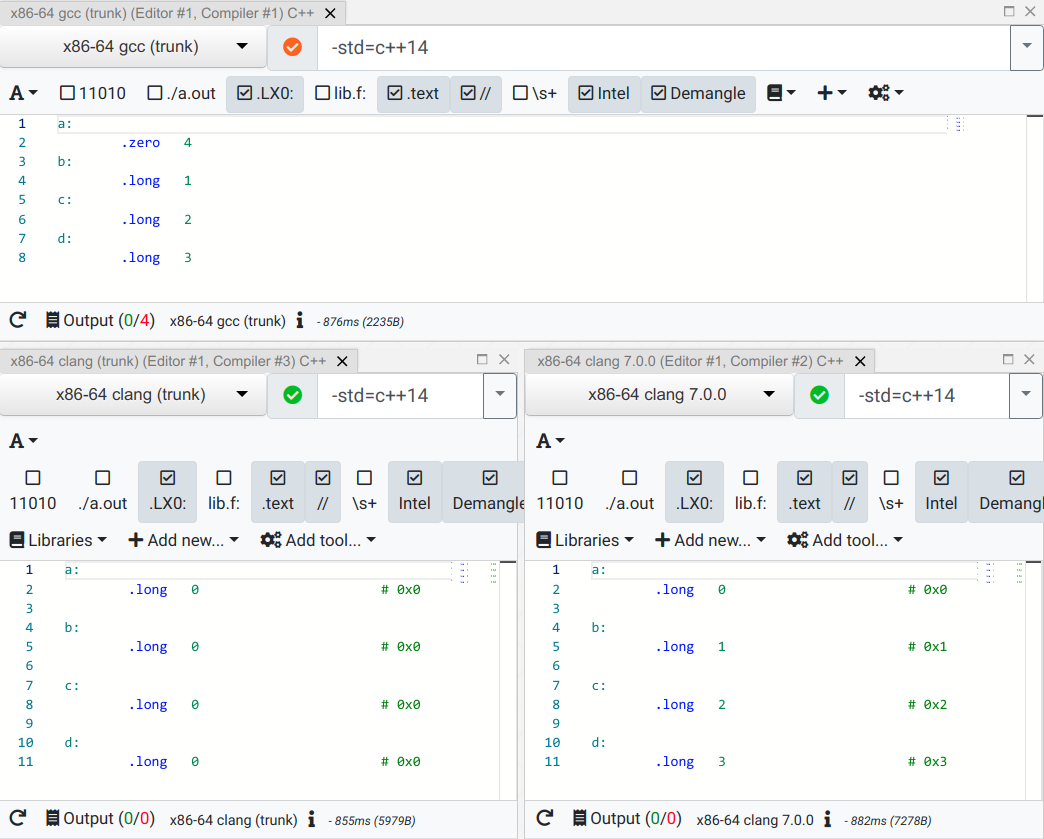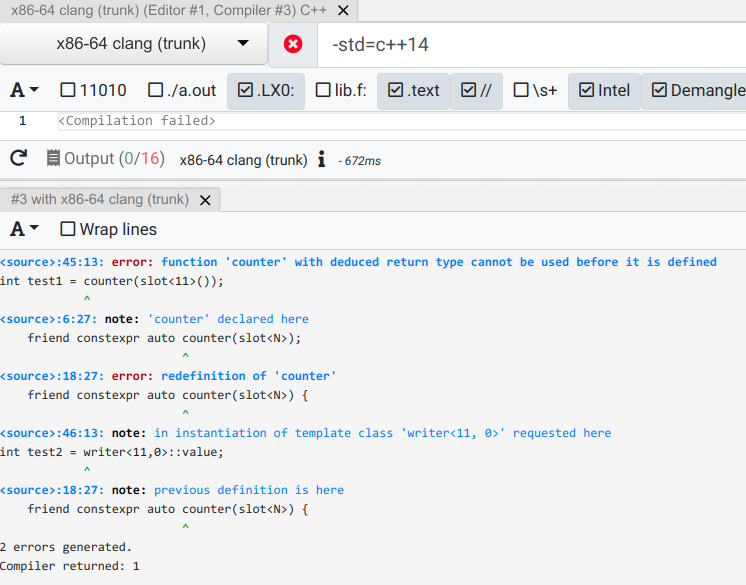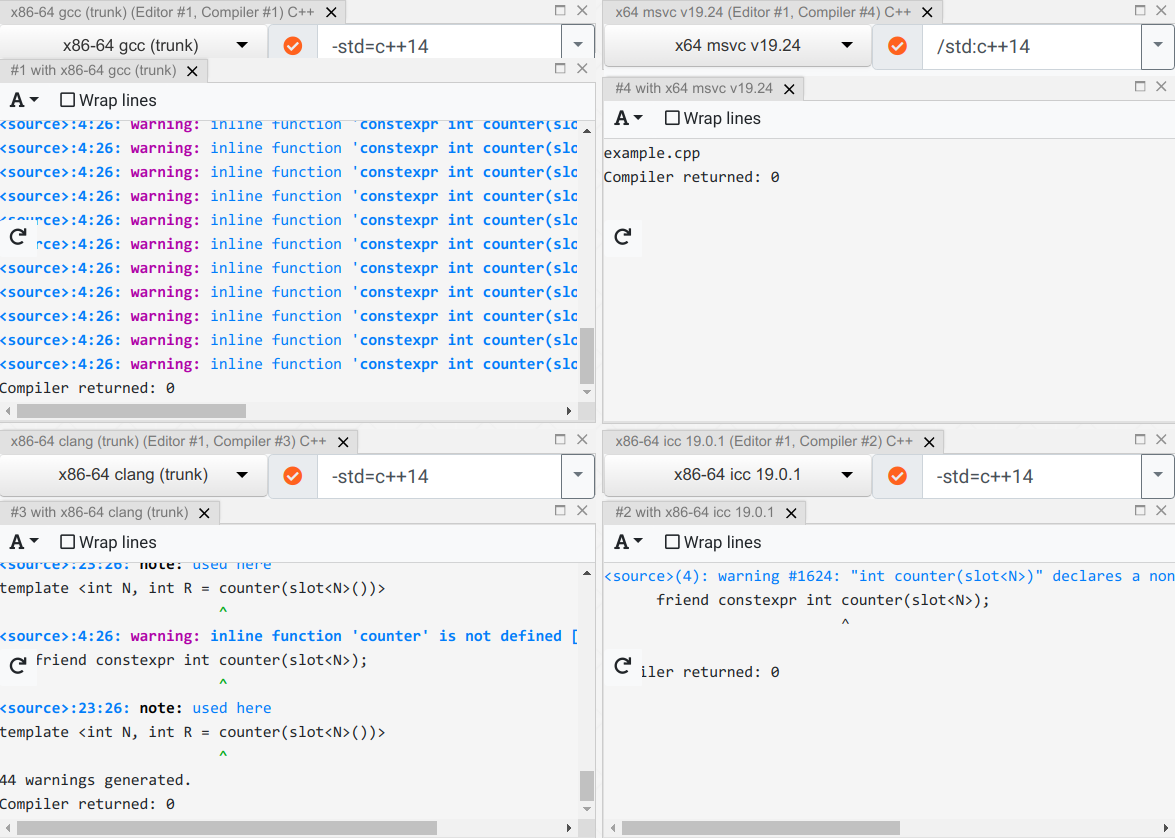TL;DR
Before you attempt to read this whole post, know that:
- a solution to the presented issue has been found by myself, but I'm still eager to know if the analysis is correct;
- I've packaged the solution into a
fameta::counterclass that solves a few remaining quirks. You can find it on github; - you can see it at work on godbolt.
How it all started
Since Filip Roséen discovered/invented, in 2015, the black magic that compile time counters via friend injection are in C++, I have been mildly obsessed with the device, so when the CWG decided that functionality had to go I was disappointed, but still hopeful that their mind could be changed by showing them a few compelling use cases.
Then, a couple years ago I decided to have a look at the thing again, so that uberswitches could be nested - an interesting use case, in my opinion - only to discover that it wouldn't work any longer with the new versions of the available compilers, even though issue 2118 was (and still is) in open state: the code would compile, but the counter would not increase.
The problem has been reported on Roséen's website and recently also on stackoverflow: Does C++ support compile-time counters?
A few days ago I decided to try and tackle the issues again
I wanted to understand what had changed in the compilers that made the, seemingly still valid C++, not work any longer. To that end, I've searched wide and far the interweb for somebody to have talked about it, but to no avail. So I've begun experimenting and came to some conclusions, that I'm presenting here hoping to get a feedback from the more-knowledged-than-myself around here.
Below I'm presenting Roséen's original code for sake of clarity. For an explanation of how it works, please refer to his website:
template<int N>
struct flag {
friend constexpr int adl_flag (flag<N>);
};
template<int N>
struct writer {
friend constexpr int adl_flag (flag<N>) {
return N;
}
static constexpr int value = N;
};
template<int N, int = adl_flag (flag<N> {})>
int constexpr reader (int, flag<N>) {
return N;
}
template<int N>
int constexpr reader (float, flag<N>, int R = reader (0, flag<N-1> {})) {
return R;
}
int constexpr reader (float, flag<0>) {
return 0;
}
template<int N = 1>
int constexpr next (int R = writer<reader (0, flag<32> {}) + N>::value) {
return R;
}
int main () {
constexpr int a = next ();
constexpr int b = next ();
constexpr int c = next ();
static_assert (a == 1 && b == a+1 && c == b+1, "try again");
}
With both g++ and clang++ recent-ish compilers, next() always returns 1. Having experimented a bit, the issue at least with g++ seems to be that once the compiler evaluates the functions templates default parameters the first time the functions are called, any subsequent call to those functions doesn't trigger a re-evaluation of the default parameters, thus never instantiating new functions but always referring to the previously instantiated ones.
First questions
- Do you actually agree with this diagnosis of mine?
- If yes, is this new behavior mandated by the standard? Was the previous one a bug?
- If not, then what is the problem?
Keeping the above in mind, I came up with a work around: mark each next() invokation with a monotonically increasing unique id, to pass onto the callees, so that no call would be the same, therefore forcing the compiler to re-evaluate all the arguments each time.
It seems a burden to do that, but thinking of it one could just use the standard __LINE__ or __COUNTER__-like (wherever available) macros, hidden in a counter_next() function-like macro.
So I came up with the following, that I present in the most simplified form that shows the problem I will talk about later.
template <int N>
struct slot;
template <int N>
struct slot {
friend constexpr auto counter(slot<N>);
};
template <>
struct slot<0> {
friend constexpr auto counter(slot<0>) {
return 0;
}
};
template <int N, int I>
struct writer {
friend constexpr auto counter(slot<N>) {
return I;
}
static constexpr int value = I-1;
};
template <int N, typename = decltype(counter(slot<N>()))>
constexpr int reader(int, slot<N>, int R = counter(slot<N>())) {
return R;
};
template <int N>
constexpr int reader(float, slot<N>, int R = reader(0, slot<N-1>())) {
return R;
};
template <int N>
constexpr int next(int R = writer<N, reader(0, slot<N>())+1>::value) {
return R;
}
int a = next<11>();
int b = next<34>();
int c = next<57>();
int d = next<80>();
You can observe the results of the above on godbolt, which I've screenshotted for the lazies.
And as you can see, with trunk g++ and clang++ until 7.0.0 it works!, the counter increases from 0 to 3 as expected, but with clang++ version above 7.0.0 it doesn't.
To add insult to injury, I've actually managed to make clang++ up to version 7.0.0 crash, by simply adding a "context" parameter to the mix, such that the counter is actually bound to that context and, as such, can be restarted any time a new context is defined, which opens up for the possibility to use a potentially infinite amount of counters. With this variant, clang++ above version 7.0.0 doen't crash, but still doesn't produce the expected result. Live on godbolt.
At loss of any clue about what was going on, I've discovered the cppinsights.io website, that lets one see how and when templates get instantiated. Using that service what I think is happening is that clang++ does not actually define any of the friend constexpr auto counter(slot<N>) functions whenever writer<N, I> is instantiated.
Trying to explicitly call counter(slot<N>) for any given N that should already have been instantiated seems to give basis to this hypothesis.
However, if I try to explicitly instantiate writer<N, I> for any given N and I that should have already been instantiated, then clang++ complains about a redefined friend constexpr auto counter(slot<N>).
To test the above, I've added two more lines to the previous source code.
int test1 = counter(slot<11>());
int test2 = writer<11,0>::value;
You can see it all for yourself on godbolt. Screenshot below.
So, it appears that clang++ believes it has defined something that it believes it hasn't defined, which kind of makes your head spin, doesn't it?
Second batch of questions
- Is my workaround legal C++ at all, or did I manage to just discover another g++ bug?
- If it's legal, did I therefore discover some nasty clang++ bugs?
- Or did I just delve into the dark underworld of Undefined Behavior, so I myself am the only one to blame?
In any event, I would warmly welcome anybody who wanted to help me get out of this rabbit hole, dispensing headaching explanations if need be. :D




next()function, however I can't really figure out how that works. In any event, I've come up with a response to my own problem, here: https://mcmap.net/q/20861/-c-compile-time-counters-revisited – Kapp__COUNTER__predefined macro in all major browsers hints at the fact that a form of compile time counter is certainly required by an enough large code base. That one isn't enough for all desired use cases, though, as it lacks knowledge about context. Projects likecopperspicehave had to invent their own way to make such a counter, which is however limited in scope and functionality. Having a generic mechanism to implement context-aware compile time counters opens up to lots of other use cases. One of them, I've mentioned in this very QA. – Kapp__FUNC__which also generates different things. But I have question.. what if we need several counters in same module? And this counter is limited by compile module so if code using it is separated, counter's increment gets broken? Maybe someone didn't liked possibility of similar effects. Or maybe it's related to instantiation of static members of templates. – ZellerSince Filip Roséen discovered/invented, in 2015is false, this technique was not discovered nor invented by that person in 2015, as I used it in 2011 and I clearly was not the "inventor" of it. I think you can trace compile-time counters back to 2005 probably... – Ledoux